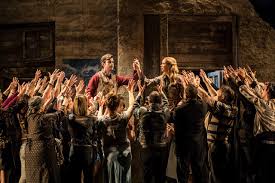London Coliseum, Monday 27 February 2017
When the RSC stages The Winter’s Tale it normally runs over three hours. Ryan Wigglesworth’s new opera based on the play runs for under two hours, so we are immediately aware that this is going to be a highly focused, not to say intense, adaptation of the play – and so it proves to be. Gone are the comic characters, all of the songs and incidental music, dancing is reduced to a brief aside. The focus is entirely on the impact of jealousy in both Leontes and Polixenes.
Vicki Mortimer’s high walled setting constantly encloses and cuts off the characters from each other, and placing both Sicilia and Bohemia under military rule gives little sense of contrast in the second act. If anything, the music underlines the unifying factors rather than the differences between the two countries.
The conclusion moves away from Shakespeare. Though Hermione returns to life there is little sense of resurrection or restoration here, and the final image is uncomfortably spectral, as the dead Mamillius wanders slowly off stage.
Ryan Wigglesworth’s score mirrors this intensity of approach with music that is frequently edgy and uncomfortable. There are few lyrical moments, even in Bohemia, and characters rarely reflect on their positions, though Iain Paterson’s finely drawn Leontes is allowed two more-extended introspective moments.
Sophie Bevan makes what she can of Hermione though the trial scene gives her nowhere near enough emotional scope for us to empathise more than at the most superficial level. Samantha Price makes more impact as Perdita though sixteen years living rurally is glossed over.
The concentration of the text makes Polixenes a more important protagonist, strongly sung by Leigh Melrose. His – spoken – assault on Florizel becomes one of the strongest moments of the evening, drawing parallels with the first act in an almost identical setting.
Smaller parts are well rounded but the most interesting musical innovation comes with the chorus. There is, of course, no chorus in Shakespeare. Verdi had to interpolate choruses into his settings and Wigglesworth does the same. They are very effective, particularly the protest for Hermione, which has no place in the original but here reflects current political unease very succinctly.
Rory Kinnear’s production is masterly in its understatement and naturalism. Even in moments of high tension he manages to maintain a convincing sense of normality taken to the edge. He brings all his experience of working in the theatre to ensure that even the most unlikely events convince and that emotions are always credible. It is a remarkable debut and he will surely be asked again – and soon!

